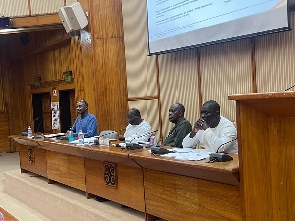The Chairman of the Council of State, Nana Otuo Siriboe II has encouraged Ghanaians to remain optimistic about the fortunes of the country, in light of Ghana’s renewed efforts towards recovery and growth, supported by the recently approved International Monetary Fund (IMF) Programme.
In a Council of State meeting on Thursday, June 8, 2023, attended by Finance Minister Ken Ofori-Atta; the Chairman commended government for the hard work that went into achieving a quick IMF deal to help restore the fortunes of the country following the recent economic shocks which exacerbated our pre-existing fiscal and debt vulnerabilities.
“There is light ahead for Ghana. We must remain optimistic and steadfast in our belief that our country will overcome the challenges it currently faces. The IMF Programme approval marks a turning point, which will energize our path to renewed growth and catalyze further opportunities for economic recovery,” he said.
The meeting formed part of the government’s effort at sensitizing and educating Ghanaians on the significance of the IMF programme which is underpinned by our Post-COVID Programme of Economic Growth (PC-PEG), the growth agenda of Government and afforded Government the opportunity to solicit input from the Council to ensure effective implementation.
Finance Minister Ken Ofori-Atta echoed the Chairman’s sentiments and acknowledged the significance of the progress Ghana had made so far. “We have made significant strides in our recovery journey, and we are optimistic about the future. This IMF Program will provide the necessary support to restore our economy and set us on a path of sustained growth,” he said.
Detailing the Programme, the Minister said the PC-PEG is a multi-faceted programme with four (4) key objectives to reset Ghana’s economic trajectory toward recovery and growth.
The foremost goal is to restore macroeconomic stability, which requires that we stem inflation, stabilize the currency, and create a favorable business environment. With the needed stability created, government’s aim is to rebuild confidence among business and investor community, setting the stage for sustainable growth anchored on the private sector.

Tackling Ghana’s fiscal challenges is the second pillar of the PC-PEG. This, Mr. Ofori-Atta said, government is committed to doing by bringing fiscal operations and public debt to sustainable levels. To achieve this, he said, “A comprehensive overhaul of tax administration is underway, along with measures to manage expenditure. Prudent fiscal policies will be implemented to alleviate the burden on future generations and ensure a sound economic foundation.”
The PC-PEG also emphasized the significance of structural reforms, Mr. Ofori-Atta, accordingly, stated that “the economic blueprint encompasses reforms in the Public Financial Management (PFM) system, State Owned Enterprises (SOEs) reforms – especially in the energy and Cocoa sector -, financial sector, tax policy and revenue administration as well as social protection reforms.
Further, he stated that the financial sector would be strengthened and provided with the necessary support through regulatory forbearances, and the operationalization of the Ghana Financial Stability Fund (GFSF), to ensure a robust and resilient financial architecture that will support private sector expansion.
In line with the government’s commitment to inclusivity, the PC-PEG was described by Finance Ministry facilitators as a programme that places a strong focus on promoting strong and inclusive growth, while safeguarding the poor and vulnerable. Initiatives to stimulate economic activity, create job opportunities, and attract investments were, therefore, to be prioritized. Concurrently, social safety nets and targeted support programs would protect the most vulnerable members of society, ensuring that the benefits of recovery are widely shared.
Responding to the Finance Ministry’s presentation, members of the Council of State called for the active cooperation of government and citizens alike, especially in the areas of revenue mobilization and expenditure rationalization.
They further highlighted the need to carry citizens along in the PC-PEG sensitization and stakeholder drive and IMF programme implementation, and recommended that the documents be translated into local language content to help foster a nationwide sense of ownership.
Nana Otuo Siriboe closed the meeting by thanking the Minister for Finance and his team for the very detailed briefing and all the work that had gone into designing the recovery programme and negotiating the IMF deal. He also encouraged the government to continue to spread the message of hope concerning Ghana’s economic future. 3
He stated, “Let us continue to engage the citizens of Ghana, explaining the fine details of this programme very well, and assuring them that there is redemption ahead. Indeed, there’s light ahead.”
Press Releases of Saturday, 10 June 2023
Source: Finance Ministry

















